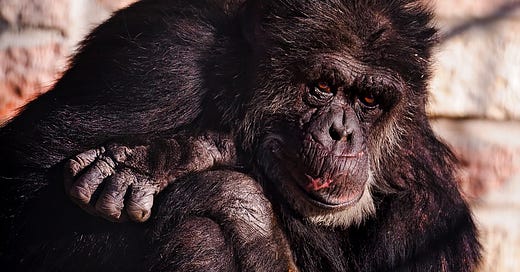"Sitting chimpanzee" by Tambako the Jaguar is licensed under CC BY-ND 2.0
When I was in my 20s, I worked for an American newswire. Whenever one of the bosses used to see three people huddled together in a corner of the newsroom, he used to make the same joke: “Is this a conspiracy?” It was funny because it was true. More often than not, the three journalists really were plotting something.
Before we begin thinking critically about conspiracy theories, it is important to recognize a very dangerous fact: Conspiracies really do happen. We also need to reflect on the lesson of the last post: Being too hard on improbable conspiracy theories can trigger cognitive dissonance in people who are drawn to this material. If they retreat into a defensive position, you have already lost the argument, no matter how good your evidence.
So, what do conspiracy theorists get right? First of all, many of them are deeply committed to self-education. Whether we agree with the results of their first attempts or not, this is hugely positive and should be encouraged. Secondly, conspiracy theories have two sides. The skeptical side, which involves probing official and mainstream explanations for flaws, is positive and should also be encouraged and developed further. For the time being, we will draw a veil over the narrative side, where theorists invent strange stories to explain away events that are difficult to understand. We will also hold fire on a discussion of their methodology or their sense of certainty. Thirdly, human beings really are conspiratorial animals, as my ex-boss had realized.
We can see just how conspiratorial we are by looking at our sister species, chimpanzees, which descended from a common ancestor millions of years ago. Dutch biologist Frans de Waal tells us a story about a power struggle in the chimp colony in Arnhem Zoo. Yeroen, the former alpha male, was overthrown by a younger chimp called Luit. Yeroen then teamed up with another young chimp called Nikkie to overthrow Luit. Eventually, though, their alliance fell apart and Luit regained power. Yeroen and Nikkie then joined forces briefly and viciously attacked Luit. He died of his wounds. In Luit’s absence, Yeroen and Nikkie’s alliance fell apart. Yeroen then spent several years developing an alliance with another young chimp, called Dandy. When they were ready to attack the alpha chimp, Nikkie tried to escape and drowned in the moat surrounding the colony.
De Waal’s story is extraordinary. We can see members of another species ganging up two against one; making alliances with a conspirator who couldn’t win on his own; going back on an implicit deal; and betrayal. My ex-boss would have asked: "“Is this a conspiracy?” And it would have been funny because it looks very close to the truth.
However, the story also helps us begin to see what conspiracy theorists get wrong. If conspiratorial behaviour is deeply rooted in our nature, there will be many conspiracies and most of them will fail. Alliances will be fragile and fall apart. You can see more examples in Chapter Two of Sharpen Your Axe, plus an example of an alleged conspiracy that appears to be a very bad bet. If you missed Chapter One, you can catch up with it here.
So, we find ourselves in a world with many plots, most of them unsuccessful, and even more theories about allegedly successful plots. How can we begin to untangle this material? Watch out for the next post on Tuesday 29th December, which will talk about some tools developed by statisticians, games theorists and philosophers that can help us gain our bearings.
Also, if you enjoy this material, please share it on social media or with friends who might enjoy it. I have decided to make Sharpen Your Axe free in order to take the brakes off, so any help spreading the word would be greatly appreciated. Also, if you haven’t subscribed, please do so. Have a great Christmas!
Update (25 April 2021)
The full beta version is available here
[Updated on 10 March 2022] Opinions expressed on Substack and Twitter are those of Rupert Cocke as an individual and do not reflect the opinions or views of the organization where he works or its subsidiaries.



